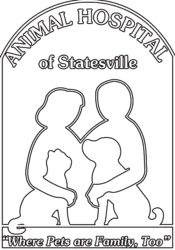
Dr. Chip Cooney
Many of our owners are quite surprised to learn that the dog’s knee and the human knee are quite similar. The upper bone (femur) sits on the lower bone (tibia). They are cushioned from one another by two pads called menisci. The bones are kept from sliding to the inside or outside by the medial and lateral collateral ligaments and from sliding front or back by the anterior (cranial) and posterior (caudal) cruciate ligaments. The final component is the patella (kneecap) and patellar tendon complex that help in biomechanics. While any of these parts may be injured the most common, by far, is the anterior cruciate ligament (ACL), just as in people.
Injury to the ACL classically occurs when the body is moving forward and the lower part of the leg stops acutely while pivoting or stepping in a hole. When this occurs, the upper leg and body continues its forward momentum and puts stress on the ACL. This can lead to rupture of the ligament. Because of the larger body mass, we frequently see this in bigger dogs but it is by no means unique to them. We see this injury in all breeds. The rupture causes acute pain due to the soft tissue injury and inflammation; therefore, most dogs hold the leg up. Over time, as the inflammation subsides, they may bear moderate weight on the leg but the instability of the joint limits their use of the leg.
Surgical repair of the knee is the recommended treatment for the injury in most cases. Unlike in the human knee, we do not replace the ligament with a graft. Rather, we make use of the soft tissue surrounding the knee to add long term strength and stability. There are many different surgical procedures to repair the injury. Our recommendation varies depending on the size of the dog and the cost associated with the surgery. In small dogs and cats, we sometimes do not advocate surgery until we see how the knee heals on its own. Regardless, anytime the ligament is injured, arthritis will occur. This happens with or without surgery though surgery helps to minimize the severity and gives a better long-term result. Joint supplements, particularly Adequan injections, have proven helpful.
Cruciate ligament injury is, unfortunately, very common in our practice. Keeping your pet at a good healthy weight and well- exercised is the best preventative but is by no means a guarantee that the injury will not occur in your pet. The good news is that with appropriate treatment and medications, most pets recover well long term.

